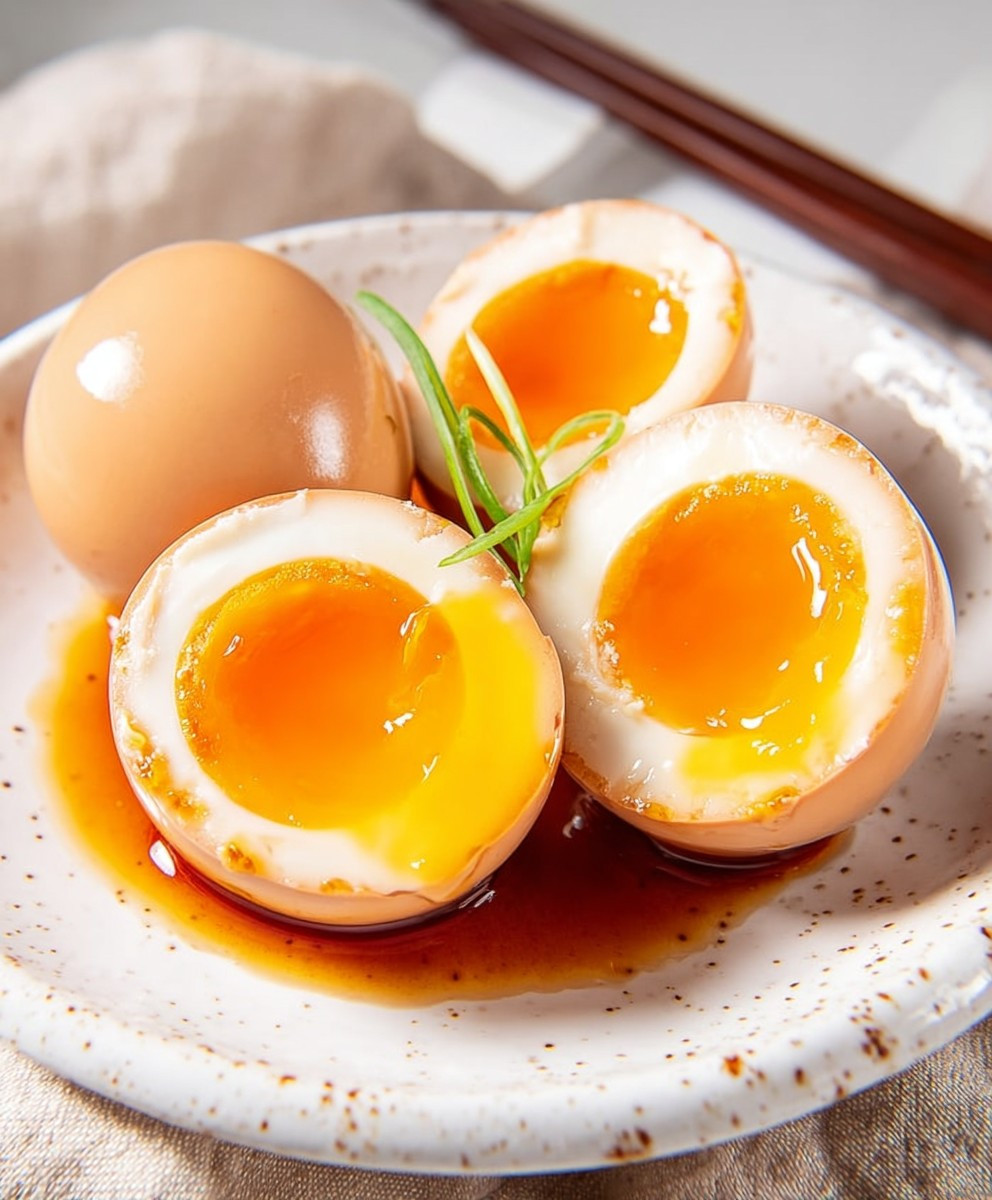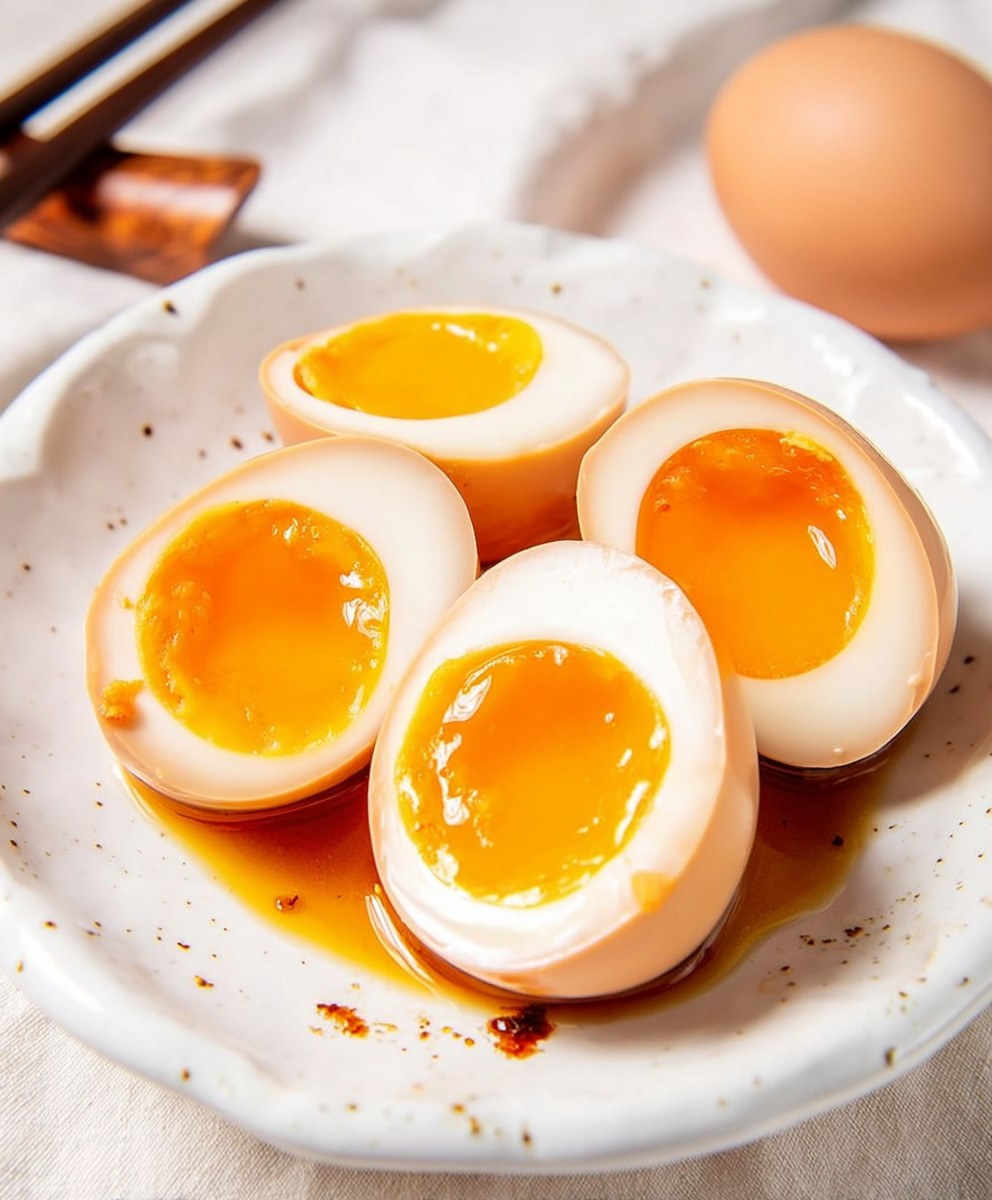Ramen Eggs Ajitama, those perfectly soft-boiled, marinated eggs with a jammy yolk, are the secret weapon to elevate your homemade ramen from good to absolutely unforgettable. Have you ever wondered how ramen restaurants achieve that mesmerizing, umami-rich flavor and that melt-in-your-mouth texture? The answer lies in these little gems!
Ajitama, also known as Ajitsuke Tamago, are a staple in Japanese cuisine, deeply intertwined with the history and evolution of ramen itself. While the exact origins are debated, the practice of marinating eggs to preserve them and enhance their flavor has been around for centuries in various Asian cultures. As ramen gained popularity, these marinated eggs became an indispensable topping, adding a layer of richness and complexity to the broth and noodles.
What makes Ramen Eggs Ajitama so irresistible? It’s the delightful combination of textures – the firm yet yielding egg white, the luscious, creamy yolk, and the savory-sweet marinade that permeates every bite. Beyond the taste, they’re incredibly convenient to make ahead of time, allowing the flavors to meld and deepen over several days. Plus, they’re not just for ramen! Enjoy them as a snack, in salads, or as a flavorful addition to rice bowls. Get ready to unlock the secrets to making these delectable eggs at home!
Ingredients:
- 6 large eggs
- 1/2 cup soy sauce (I prefer low sodium)
- 1/4 cup mirin
- 2 tablespoons sake (optional, but adds depth)
- 1 cup water
- 1 sheet dried kombu (optional, for extra umami)
- 1 clove garlic, smashed (optional, for a subtle garlic flavor)
- 1/2 inch ginger, peeled and sliced (optional, for a hint of spice)
Preparing the Marinade:
Okay, let’s get started with the marinade. This is where the magic happens, and it’s super easy to put together. The key is to balance the salty, sweet, and savory flavors. I like to adjust it to my taste, so feel free to do the same!
- Combine the liquids: In a small saucepan, pour in the soy sauce, mirin, sake (if using), and water.
- Add aromatics (optional): If you’re using kombu, garlic, and ginger, add them to the saucepan now. These will infuse the marinade with extra flavor. The kombu adds a subtle sea-like umami, the garlic a gentle bite, and the ginger a warm spice.
- Simmer the marinade: Place the saucepan over medium heat and bring the mixture to a gentle simmer. You don’t want it to boil vigorously, just a gentle simmer.
- Let it simmer for 5 minutes: This allows the flavors to meld together beautifully. Keep an eye on it to make sure it doesn’t boil over.
- Cool the marinade: Remove the saucepan from the heat and let the marinade cool completely. This is important because you don’t want to cook the eggs when you add them later. You can speed up the cooling process by placing the saucepan in an ice bath.
- Strain the marinade (optional): Once the marinade is cool, you can strain it through a fine-mesh sieve to remove the kombu, garlic, and ginger. This will give you a smoother marinade, but it’s not essential. I usually strain it just to make sure there are no little bits floating around.
Cooking the Eggs:
Now for the most crucial part: cooking the eggs! This is where precision is key to getting that perfect, jammy yolk. Don’t worry, I’ll walk you through it step-by-step.
- Prepare an ice bath: Fill a large bowl with ice and water. This is essential for stopping the cooking process and preventing the eggs from overcooking.
- Gently lower the eggs into boiling water: Bring a pot of water to a rolling boil. Once boiling, gently lower the eggs into the water using a slotted spoon. This prevents them from cracking. I usually do this one at a time.
- Cook for exactly 6-7 minutes: This is the sweet spot for a perfectly jammy yolk. I prefer 6 minutes and 30 seconds, but experiment to find your perfect time. Set a timer and don’t deviate! The exact time will depend on the size of your eggs and the intensity of your stove.
- Immediately transfer to the ice bath: As soon as the timer goes off, immediately transfer the eggs to the ice bath. This will stop the cooking process and make them easier to peel.
- Let the eggs cool completely in the ice bath: This usually takes about 10-15 minutes. Make sure the eggs are completely cool before peeling.
- Peel the eggs carefully: Gently tap the eggs all over to crack the shell. Then, start peeling under cold running water. The water helps to separate the shell from the egg. Be patient and peel carefully to avoid tearing the egg white.
Marinating the Eggs:
Almost there! Now it’s time to let the eggs soak up all that delicious marinade flavor. This is where the magic truly happens.
- Place the peeled eggs in a resealable bag or container: I prefer using a resealable bag because it allows the marinade to coat the eggs more evenly. You can also use a container, but make sure it’s not too big, so the eggs are mostly submerged.
- Pour the cooled marinade over the eggs: Make sure the eggs are fully submerged in the marinade. If they’re not, you can add a little more soy sauce and water to cover them.
- Remove air from the bag (if using): If you’re using a resealable bag, gently squeeze out any excess air before sealing it. This will help the marinade to coat the eggs more evenly.
- Refrigerate for at least 4 hours, or preferably overnight: The longer the eggs marinate, the more flavorful they will be. I usually marinate them overnight for the best results. You can marinate them for up to 24 hours.
- Turn the eggs occasionally: If you’re using a container, turn the eggs occasionally to ensure they marinate evenly. If you’re using a bag, you can gently massage the bag to redistribute the marinade.
Serving and Storage:
Finally, the moment you’ve been waiting for! Time to enjoy your perfectly made Ajitama ramen eggs.
- Remove the eggs from the marinade: Take the eggs out of the marinade and gently pat them dry with a paper towel.
- Slice the eggs in half (optional): This is optional, but I think it looks really nice to slice the eggs in half before serving. It also shows off that beautiful, jammy yolk.
- Serve immediately: Ajitama ramen eggs are best served immediately. They’re delicious on their own, as a topping for ramen, or as part of a bento box.
- Store leftover eggs in the refrigerator: If you have any leftover eggs, store them in an airtight container in the refrigerator. They will keep for up to 3 days. The marinade can be reused once, but I recommend making a fresh batch for the best flavor.
Tips and Tricks for Perfect Ajitama:
- Egg Freshness: Use eggs that are a few days old. Fresh eggs are harder to peel.
- Altitude Adjustment: If you live at a high altitude, you may need to adjust the cooking time slightly. Start with 7 minutes and adjust from there.
- Marinade Variations: Feel free to experiment with the marinade. You can add a splash of rice vinegar for a tangier flavor, or a pinch of red pepper flakes for a little heat.
- Don’t Overcook: The key to perfect Ajitama is a jammy yolk. Overcooked eggs will have a dry, crumbly yolk.
- Gentle Handling: Be gentle when handling the eggs, especially when peeling them. They are delicate and can easily tear.
Troubleshooting:
- Eggs are hard to peel: Make sure you’re using eggs that are a few days old and that you’re cooling them completely in the ice bath.
- Yolks are overcooked: Reduce the cooking time by 30 seconds.
- Yolks are undercooked: Increase the cooking time by 30 seconds.
- Marinade is too salty: Add a little more water to the marinade.
- Marinade is not flavorful enough: Add a little more soy sauce, mirin, or sake to the marinade.
Enjoy your homemade Ajitama ramen eggs! I hope you found this recipe helpful and easy to follow. Let me know in the comments if you have any questions or if you try this recipe yourself. Happy cooking!
Conclusion:
So, there you have it! These Ramen Eggs, or Ajitama as they’re traditionally known, are more than just a topping; they’re a flavor explosion waiting to happen. I truly believe this recipe is a must-try for anyone who loves ramen, enjoys exploring new culinary horizons, or simply appreciates a perfectly cooked, intensely flavorful egg. The combination of the soy sauce, mirin, and sake (or sherry) creates a marinade that penetrates the egg white and yolk, transforming them into something truly special. The subtle sweetness, the savory umami, and the creamy, almost melt-in-your-mouth texture of the yolk – it’s an experience you won’t soon forget.
But the beauty of this recipe lies not only in its simplicity but also in its versatility. While these eggs are undeniably fantastic in ramen, don’t limit yourself! Think about slicing them and adding them to a rice bowl for an extra layer of richness and flavor. They’re also incredible in salads, adding a protein boost and a burst of savory goodness. I’ve even been known to enjoy them straight from the fridge as a quick and satisfying snack.
Serving Suggestions and Variations:
* Ramen Perfection: Of course, the classic way to enjoy these eggs is in a steaming bowl of your favorite ramen. Whether you prefer tonkotsu, shoyu, or miso ramen, these eggs will elevate your bowl to a whole new level.
* Rice Bowl Delight: Slice the eggs and arrange them artfully on top of a bed of fluffy white rice. Drizzle with a little of the marinade for extra flavor. Add some chopped scallions and toasted sesame seeds for a complete and satisfying meal.
* Salad Sensation: Add sliced or quartered eggs to your favorite salad for a protein boost and a burst of umami flavor. They pair particularly well with Asian-inspired salads with ingredients like edamame, seaweed, and ginger dressing.
* Snack Attack: Sometimes, the simplest pleasures are the best. Enjoy these eggs straight from the fridge as a quick and easy snack. They’re a great source of protein and healthy fats, and they’ll keep you feeling satisfied until your next meal.
* Spice it Up: For a little extra kick, add a pinch of red pepper flakes or a dash of chili oil to the marinade. This will give the eggs a subtle heat that complements the other flavors beautifully.
* Sweeten the Deal: If you prefer a sweeter flavor profile, add a tablespoon of brown sugar or honey to the marinade. This will create a richer, more decadent flavor.
* Herbal Infusion: Experiment with adding fresh herbs to the marinade, such as ginger, garlic, or scallions. This will infuse the eggs with a subtle herbal aroma and flavor.
I truly hope you’ll give this recipe a try. I’m confident that you’ll be amazed by the flavor and texture of these Ramen Eggs. It’s a simple recipe with a huge payoff, and I know you’ll love it as much as I do.
Once you’ve made them, I’d love to hear about your experience! Did you try any of the variations? What did you serve them with? Share your photos and comments in the comments section below. I can’t wait to see what you create! Happy cooking!
Ramen Eggs Ajitama: The Ultimate Guide to Perfect Ajitsuke Tamago
Soft-boiled eggs marinated to perfection with a jammy yolk, great in ramen or as a tasty snack.
Ingredients
- 6 large eggs
- 1/2 cup soy sauce (low sodium preferred)
- 1/4 cup mirin
- 2 tablespoons sake (optional)
- 1 cup water
- 1 sheet dried kombu (optional)
- 1 clove garlic, smashed (optional)
- 1/2 inch ginger, peeled and sliced (optional)
Instructions
- Prepare the Marinade: In a small saucepan, combine soy sauce, mirin, sake (if using), and water. Add kombu, garlic, and ginger (if using).
- Simmer: Bring the marinade to a gentle simmer over medium heat for 5 minutes.
- Cool: Remove from heat and let the marinade cool completely. Strain if desired.
- Prepare Ice Bath: Fill a large bowl with ice and water.
- Cook the Eggs: Gently lower eggs into boiling water using a slotted spoon. Cook for 6-7 minutes (adjust for desired yolk consistency).
- Ice Bath: Immediately transfer eggs to the ice bath and let cool completely (10-15 minutes).
- Peel: Gently tap eggs to crack the shell and peel under cold running water.
- Marinate: Place peeled eggs in a resealable bag or container. Pour cooled marinade over the eggs, ensuring they are submerged. Remove excess air from the bag (if using).
- Refrigerate: Refrigerate for at least 4 hours, or preferably overnight (up to 24 hours), turning eggs occasionally.
- Serve: Remove eggs from marinade, pat dry, and slice in half (optional). Serve immediately.
- Storage: Store leftover eggs in an airtight container in the refrigerator for up to 3 days.
Notes
- Use eggs that are a few days old for easier peeling.
- Adjust cooking time based on egg size and stove intensity.
- Marinating overnight yields the best flavor.
- Experiment with marinade variations (rice vinegar, red pepper flakes).
- Be gentle when handling and peeling the eggs.
- The marinade can be reused once, but a fresh batch is recommended for optimal flavor.
- For high altitude, increase cooking time slightly.





